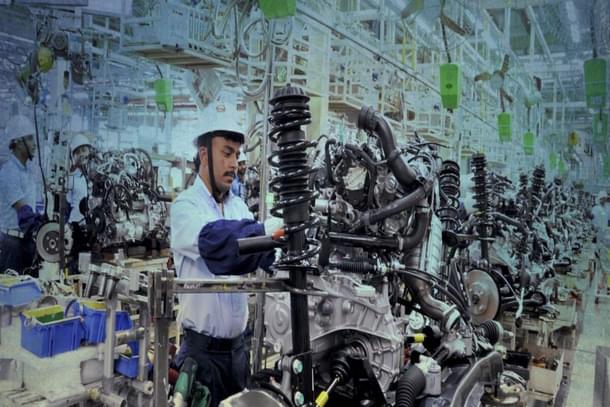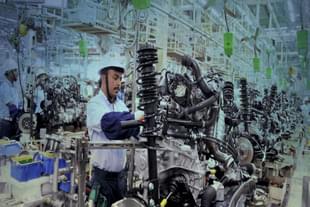News Brief
India's Manufacturing PMI Drops To 14-Month Low, At 56.3 In February But Hiring Remains Stable: S&P Global
Vansh Gupta
Mar 03, 2025, 04:42 PM | Updated 04:42 PM IST
Save & read from anywhere!
Bookmark stories for easy access on any device or the Swarajya app.


India’s manufacturing sector witnessed its slowest growth in over a year last month as demand cooled, but employment generation continued at a healthy pace, and inflation showed signs of easing, according to a private survey released on 3 March, as reported by The Hindu.
The HSBC final India Manufacturing Purchasing Managers' Index (PMI), compiled by S&P Global, declined to 56.3 in February from 57.7 in January, marking its lowest level since December 2023.
The preliminary estimate had projected a slightly higher figure of 57.1. Despite the decline, the index has remained in expansionary territory—above the threshold of 50—for 44 consecutive months, making it the longest uninterrupted growth streak since July 2013.
A slight weakening in domestic demand was evident as the new orders and output sub-indexes fell to 14-month lows. However, factories continued to invest in technology and launch new projects, signaling long-term confidence. International demand, which had reached a 14-year high in January, also softened in February.
Commenting on the latest trends, Pranjul Bhandari, chief India economist at HSBC, stated, “Although output growth slowed to the weakest level since December 2023, overall momentum in India's manufacturing sector remained broadly positive in February. Robust global demand continued to boost growth in the Indian manufacturing sector, which increased its purchasing activity and employment.”, quoted as saying by The Hindu.
Manufacturers extended their hiring streak for a full year, albeit at a slightly reduced pace compared to January, which had seen record job additions in the survey’s 20-year history.
Meanwhile, input costs registered their slowest rise in 12 months, and the rate of increase in output prices fell to a five-month low, reflecting a partial pass-through of costs to consumers. HSBC noted that “buoyant demand and greater labour costs underpinned the hike in fees.”
Retail inflation eased to a five-month low in January, reinforcing expectations of another interest rate cut by the Reserve Bank of India (RBI).
The central bank had already eased its policy last month to support an economy expected to grow at its slowest rate in four years this fiscal year. RBI Monetary Policy Committee member Nagesh Kumar highlighted that the slowdown in manufacturing, a key driver of job creation, alongside moderating inflation, played a crucial role in the central bank’s decision to lower interest rates.
Vansh Gupta is an Editorial Associate at Swarajya.





